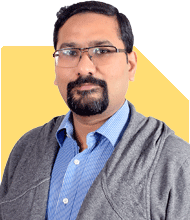Mayank Rautela | Answer |Ask -Follow
HR Expert - Answered on Apr 22, 2021
A management graduate from the Symbiosis Institute of Management Studies with a master's degree in labour laws from Pune University, Rautela has over 20 years of experience in general management, strategic human resources, global mergers and integrations and change management.... more

Hello Sir,
I am Abhishek, age 41, working in an MNC from last six years, as principal design engineer, electrical, in Mumbai.
I am a resident of Pune with my family settled there.
I have 18 years of experience in electrical design and PLC (programmable logic controller) automation industry.
But due to office politics and partial behaviour from management, I am dead in my career.
I am also getting very less opportunity in PLC automation, hence no new skills additions in my professional area.
I tried hard to change my job but couldn't get any. I also discussed with my manager about my goals and wish to work on PLC automation, but didn't get any major opportunities.
Recently I have got another opportunity in Pune but will have to travel more to foreign locations. I have to travel in my current job as well but the new company is offering better designation, better salary and better opportunities for me to work with new technologies in PLC automation.
However, it is a very small Indian organisation compared to my current MNC I work for.
I am in dilemma whether I should take up the new job or not?
What is your advice?
Thanks,
Abhishek
Hi Abhishek.
If you read my column, you will realise that during this global pandemic I typically do not advise anyone to change their job.
But your case is different as you are getting to work in your area of interest and will also be able to move to your home town.
Do some more analysis and reference check about this new company and management.
If it's positive, then you can go ahead and take this new opportunity.
Today, Indian companies with good management can offer career opportunities far more exciting than any MNC.
You may like to see similar questions and answers below
Shekhar Kumar | Answer |Ask -Follow
Leadership, HR Expert - Answered on Apr 23, 2024
Shekhar Kumar | Answer |Ask -Follow
Leadership, HR Expert - Answered on May 03, 2024
Aashish Sood |127 Answers |Ask -Follow
CAT, Management Expert - Answered on May 30, 2024
Prof Suvasish Mukhopadhyay | Answer |Ask -Follow
Career Counsellor - Answered on Dec 01, 2024
Dr Shyam Jamalabad |107 Answers |Ask -Follow
Dentist - Answered on Dec 05, 2025
Dr Shyam Jamalabad |107 Answers |Ask -Follow
Dentist - Answered on Dec 05, 2025
Dr Dipankar Dutta |1836 Answers |Ask -Follow
Tech Careers and Skill Development Expert - Answered on Dec 05, 2025
Ulhas Joshi |280 Answers |Ask -Follow
Mutual Fund Expert - Answered on Dec 05, 2025
Dr Dipankar Dutta |1836 Answers |Ask -Follow
Tech Careers and Skill Development Expert - Answered on Dec 04, 2025
Ravi Mittal |676 Answers |Ask -Follow
Dating, Relationships Expert - Answered on Dec 04, 2025
Anu Krishna |1745 Answers |Ask -Follow
Relationships Expert, Mind Coach - Answered on Dec 04, 2025
Anu Krishna |1745 Answers |Ask -Follow
Relationships Expert, Mind Coach - Answered on Dec 04, 2025
Mayank Chandel |2562 Answers |Ask -Follow
IIT-JEE, NEET-UG, SAT, CLAT, CA, CS Exam Expert - Answered on Dec 04, 2025
Mayank Chandel |2562 Answers |Ask -Follow
IIT-JEE, NEET-UG, SAT, CLAT, CA, CS Exam Expert - Answered on Dec 04, 2025































